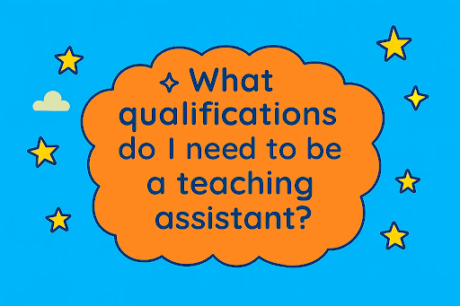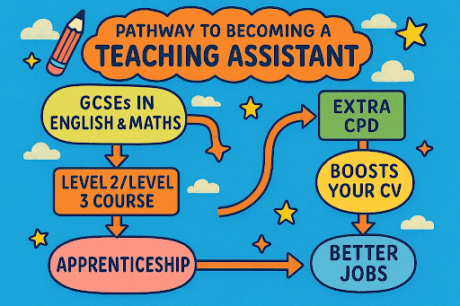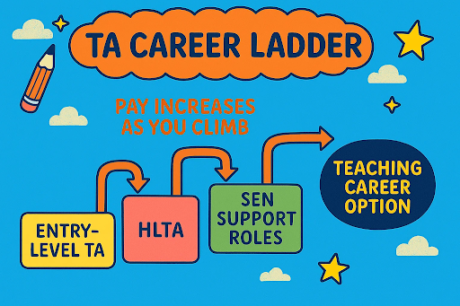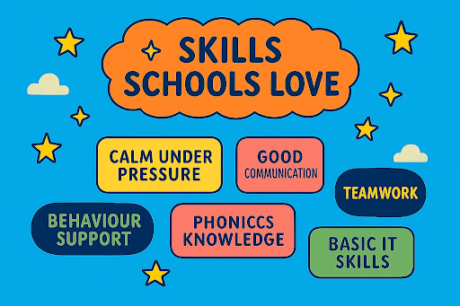What qualifications do I need to be a teaching assistant? To get started, you’ll need GCSEs in English and Maths (grades 9–4) or the equivalent. You also need either a Level 2 or Level 3 TA course or a Level 3 apprenticeship. An enhanced DBS that covers the children’s barred list is required. Finally, you should know the basics of safeguarding by reading KCSIE Part 1. With these done, you’ll feel ready to work in schools and gain real classroom experience.

What Qualifications Do I Need to Be a Teaching Assistant (What Schools Want)
Becoming a teaching assistant in the UK is easier than you think. Schools usually look for a few key things to make sure you’re ready, safe, and confident in the classroom.

GCSEs in English & Maths
Most schools ask for English and Maths GCSEs at grades 9–4. Functional Skills usually work too. These subjects show you can read, write, and use numbers every day in the classroom. Even simple tasks, like helping children with reading or basic maths, rely on these skills.
TA Training/Qualification
Schools like it if you’ve done some training to understand classrooms. You can take a Level 2 or Level 3 Supporting Teaching & Learning course (CACHE or NCFE). Or, you can do a Level 3 TA apprenticeship and learn while working. This training shows you how to support teachers, manage small groups, and handle different learning needs.
Enhanced DBS Check
You must pass an enhanced DBS check that includes the children’s barred list. It proves you are safe to work with children. Schools take it seriously, but it’s usually simple if you have nothing to worry about.
Basic Safeguarding Knowledge
Schools expect you to read Keeping Children Safe in Education (KCSIE) Part 1. It teaches you how to keep children safe, spot warning signs, and report concerns. Understanding safeguarding gives teachers and parents confidence in your ability to protect children.
How to Become a Teaching Assistant: 10 Easy Steps
- Check your GCSEs – Make sure you have English and Maths at grades 9–4. Functional Skills usually work too.
- Pick your path – You can do a Level 2 or Level 3 TA course, or a Level 3 apprenticeship and earn while learning.
- Get some experience – Volunteer for a morning or two each week and ask for a reference from the school.
- Learn safeguarding – Read KCSIE Part 1 and know who to tell if something feels wrong.
- Start your DBS – Get an enhanced DBS check, including the children’s barred list. You might also join the Update Service.
- Add a CPD badge – Extra courses in phonics, autism, ADHD, behaviour, or first aid look great on your CV.
- Fix your CV – Lead with your classroom experience, GCSEs, and TA course or apprenticeship.
- Apply smart – Use council or trust job boards, set alerts, and tailor each application for the role.
- Prep for interviews – Be ready to show simple phonics, behaviour handling, or a quick safeguarding example.
- Start like a pro – Bring your right-to-work documents and DBS, and meet the SENCO and safeguarding lead.
Pick Your Route
College course: You can start with Level 2 and move up to Level 3. Most courses include a school placement, so you get real classroom experience while learning.
Apprenticeship: This lets you earn while you train. Most Level 3 apprenticeships last 12–24 months and give hands-on experience in a real classroom.
Direct apply + volunteer: Got GCSEs and some classroom time? You can apply for entry-level roles straight away. Volunteering a few mornings helps you learn the ropes and get references.
Must-Have Compliance (DBS & Safeguarding)
Enhanced DBS
You need an enhanced DBS check that includes the children’s barred list. It’s a must for any school job.
Interim Checks
Sometimes schools do temporary checks while your DBS is being processed. It just depends on the school.
KCSIE Part 1
Read Keeping Children Safe in Education (KCSIE) Part 1 before you start. Know who to talk to if something feels wrong.
UK Nation Differences (Quick View)
The rules for teaching assistants vary across the UK.
- England: You need GCSEs plus a Level 2 or 3 course or apprenticeship. Also, enhanced DBS and KCSIE knowledge.
- Wales: You must register with the Education Workforce Council (EWC) before starting.
- Scotland: Jobs are usually called Pupil Support Assistant (PSA). The local council sets the requirements.
- Northern Ireland: It’s similar to England, but check Education Authority job listings for details.
Move Up the Ladder (HLTA)

If you want to take the next step, becoming an HLTA is a smart move. It means you can lead small groups, cover classes short-term, and help with lesson planning. To get there, you need solid classroom experience, GCSE-level literacy and numeracy, and to pass the HLTA standards assessment. Plus, HLTA roles usually come with better pay and more responsibility. Overall, it’s a great way to grow your career and gain confidence managing different classroom situations.
Skills Schools Love (Add to Your CV)
Schools love TAs who stay calm, speak clearly, work well in a team, and keep records tidy. Basic IT skills help you support lessons, track progress, and share information quickly with teachers. Knowing about SEND, like autism, ADHD, and dyslexia, shows you can help all kinds of learners. Phonics skills help with reading groups, while behaviour support helps you manage tricky situations calmly. Being friendly with parents and knowing how to talk about safeguarding shows you care and are responsible.

Navigating Challenges as a Teaching Assistant
Being a TA is fun, but it can have tricky moments. Here’s how you can handle them.
- Managing behaviour: Some kids act out or lose focus. So, stay calm, patient, and guide them gently.
- Helping with different needs: Every child learns in their own way. For example, adjust for SEND, ADHD, autism, or dyslexia.
- Juggling tasks: You might help a group, assist a teacher, and support kids one-on-one. Therefore, prioritise and ask for help.
- Keeping records: Notes and reports can pile up. Also, stay organised and update them regularly.
- Talking to parents: Some chats can be tricky. Instead, be friendly, clear, and stick to the facts.
- Building confidence: You might feel unsure at first. However, keep learning, ask questions, and gain experience.
Doing these things shows schools you’re reliable, skilled, and ready to make a difference every day.
Fast-Track Your Start: CPD Courses That Open Doors
Why CPD helps: Doing extra courses shows schools you’re ready for the classroom. It also gives you real, practical skills and boosts your confidence in interviews. Plus, CPD can help you move faster into Level 2 or Level 3 roles, or even a TA apprenticeship, because it proves you’ve put in the extra effort.
Great first picks: Some courses give you skills schools really value. For example:
- Phonics – Helps you support reading groups and improve kids’ literacy.
- Autism/ADHD awareness – Shows you how to understand different learning needs and behaviours.
- Behaviour support – Teaches you ways to handle tricky behaviour calmly.
- ELKLAN/communication skills – Helps you support children with speech or communication difficulties.
- Paediatric first aid – Gives you the confidence to handle minor accidents or emergencies.
Add these courses to your CV and mention them in interviews to show you’re ready.
Recommended course: The Teaching Assistant course at Unified Course helps you learn skills, boost confidence, and be ready for the classroom.
FAQs
Can I work as a teaching assistant with no qualifications?
- Yes, some schools accept volunteers or entry-level TAs with GCSEs and classroom experience.
How long does it take to train to be a teaching assistant?
- Level 2/3 courses usually take a few months, while apprenticeships last 12–24 months.
Is it hard to be a teaching assistant?
- It can be challenging, but being patient, organised, and caring makes it much easier.
What is the best TA qualification?
- Level 3 Supporting Teaching & Learning or a Level 3 TA apprenticeship are highly valued.
How much does a TA get paid in the UK?
- Pay varies, but most TAs earn around £12–£15 per hour depending on location and experience.
What is the lowest grade you can get with TA?
- For GCSEs, schools usually ask for grades 9–4 (or Functional Skills equivalent) to start.
Final Thoughts
So, what qualifications do I need to be a teaching assistant? Now you know! With GCSEs in English and Maths, a Level 2 or 3 TA course or apprenticeship, an enhanced DBS, and basic safeguarding knowledge, you’re ready to step into the classroom. Volunteering, extra CPD courses, and picking the right path—college, apprenticeship, or direct entry—will boost your skills and confidence.
Schools love calm, clear, and helpful TAs who understand SEND, support learning, and communicate well with parents.
With preparation and a proactive mindset, you’ll thrive and make a real difference every day.




